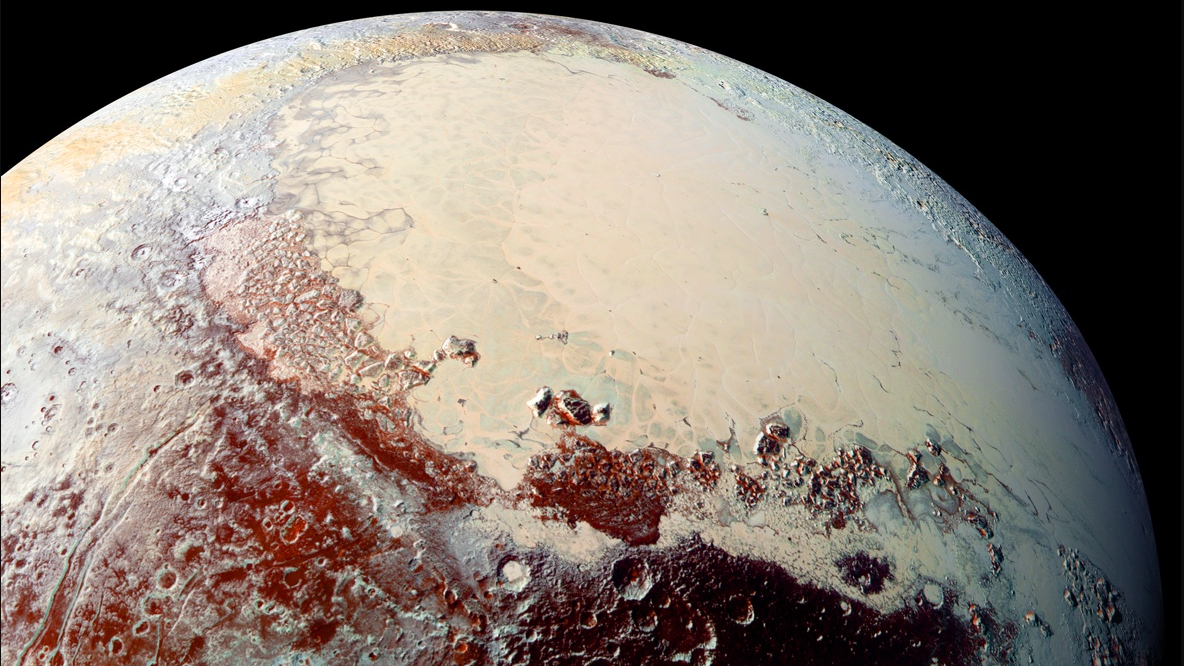We could float effortlessly in Pluto's subsurface ocean

Pluto's surface, fitting for a world whose surface shivers at a cryogenic -364 F (-220 C), is frozen solid.
But beneath that nitrogen ice may lie a subsurface ocean of liquid water. A recent study suggested what that ocean might look like: It might be deeper than Earth's crust and denser than Earth's seawater.
It may seem odd to search for liquid water on a world as frigid and distant as Pluto. But in data from New Horizons, scientists have found a few clues hinting at a liquid water layer beneath Pluto's surface. For one, Pluto lacks a bulge at its equator, a feature that is less likely to form if a body has a liquid interior. Secondly, Pluto's icy surface appears to have fractured due to stretching over time, which could have been caused by liquid water freezing underneath the nitrogen ice on its surface, as water is one of the few substances that expands when it freezes.
Related: Supervolcano eruption on Pluto hints at hidden ocean beneath the surface
Most strikingly, some scientists believe that Pluto holds cryovolcanoes that spew out water vapor or even solid water ice. That water has to come from somewhere — and a layer of liquid water beneath Pluto's crust would fit the description.
Researchers at Washington University in St. Louis and the Lunar and Planetary Institute in Houston set about constructing a model of what that liquid layer might look like. In particular, they wanted to match Sputnik Planitia — a heart-shaped lowland basin on Pluto's surface thought to be the aftermath of an impact. So, the researchers tried different configurations of ocean thickness and water density that would result in the Sputnik Planitia criss-crossed with cracks that New Horizons observed.
"We estimated a sort of Goldilocks zone where the density and shell thickness is just right," said Alex Nguyen, a graduate student at Washington University in St Louis and one of the authors, in a statement.
Breaking space news, the latest updates on rocket launches, skywatching events and more!
Their calculations indicated that a Plutonian ocean would most likely be around 25 to 50 miles (40 to 80 kilometers) thick, and about 8 percent denser than Earth seawater. That is about as dense as the Great Salt Lake.
But the idea of a Plutonian ocean is still controversial. Scientists don't know enough about Pluto to know if the evidence really points to liquid water or if it's just circumstantial. Most recently, a study simulating the origin of Sputnik Planitia suggested that the heart-shaped basin was most likely to have formed if Pluto had a solid interior.
So, until a successor to New Horizons lets us revisit Pluto, what lies beneath the world's surface will remain cloaked in shadow.
Nguyen and co-author Patrick McGovern published their work in the journal Icarus on February 15.

Rahul Rao is a graduate of New York University's SHERP and a freelance science writer, regularly covering physics, space, and infrastructure. His work has appeared in Gizmodo, Popular Science, Inverse, IEEE Spectrum, and Continuum. He enjoys riding trains for fun, and he has seen every surviving episode of Doctor Who. He holds a masters degree in science writing from New York University's Science, Health and Environmental Reporting Program (SHERP) and earned a bachelors degree from Vanderbilt University, where he studied English and physics.
